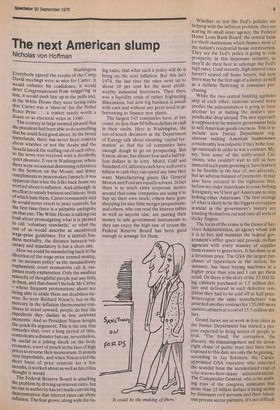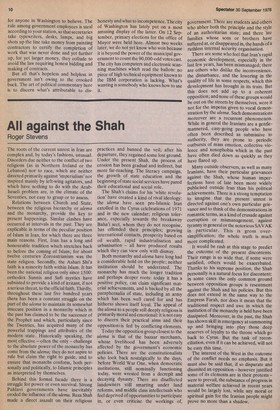The next American slump
Nicholas von Hoffman
Washington Everybody agreed the results of the Camp David meetings were so nice for Carter. It would enhance his confidence, it would deter Congresspersons from sniggering at him, it would push him up in the polls and, at the White House they were laying odds that Carter was a 'shoo-in' for the Nobel Peace Prize . . . a trinket surely worth a dozen or so electoral votes in 1980.
The country at large seemed pleased that the president had been able to do something that he could feed good about. In the broad hinterlands, there has never been concern about whether or not the Arabs and the Israelis knock the stuffing out of each other, so the news was received with a decidedly quiet pleasure. Even in Washington, where there were occasional distressing references to the Sermon on the Mount, and lesser compliments to peacemaker Jimmeh, it was apparent that what the folks back home are worried about is inflation. And although, in an effort to satisfy business and labour, both of which hate them, Carter consistently said he would never resort to price controls, for the first time there is a palpable ambiguity on that one. The White House is talking out loud about promulgating what it is pleased to can 'voluntary standards,' or what the rest of us would describe as unenforced wage-price guidelines. For a skittish business mentality, the distance between voluntary and mandatory is but a short one. How we could be meandering back in the direction of the wage-price control swamp, or 'an incomes policy' as the mendaciously euphemistic court economists call it, surpasses ready explanation. Only the smallest minority of thoughtful people put any faith in them, and that doesn't include Mr Carter — whose frequent protestations about not being able to abide them are doubtless sincere. So were Richard Nixon's; but as the mercury in the inflation thermometer continues to crawl upward, people do buy the expedients they disdain in less awkward moments. And so President Nixon bought the quick-fix argument. This is the one that concedes that, over a long period of time, controls are a disaster but can, nevertheless, be useful as a jolting shock on the body economic, a sort of punch in the face of high prices to reverse their momentum. It sounds very improbable, and when Nixon tried the short burst of price controls for a few months, it worked about as well as his critics thought it would.
The Federal Reserve Board is attacking the problem by driving up interest rates, but no one in authority has yet made convincing demonstration that interest rates can abate inflation. The fear grows, along with the ris ing rates, that what such a policy will do is bring on the next inflation. But this isn't 1974, the last time the rates went up to about 10 per cent for the most creditworthy industrial borrowers. Then there was a liquidity crisis of rather frightening dimensions, but now big business is awash with cash and without any great need to go borrowing to finance new plants. The largest 545 companies have, at last count, no less than 80 billion dollars in cash in their vaults. Here in WaShington, the out-of-touch dreamers at the Department of Energy talk about ensuring 'capital formation' so that the oil companies have enough dough to go on prospecting. But Exxon, alone, has almost four and a half billion dollars in its kitty. Mobil, Gulf and Standard of California each have well over a billion in cash they can spend any time they want. Manufacturing giants like General Motors and Ford are equally solvent. In fact there is so much extra corporate money around that some companies are using it to buy up their own stock; others have gone shopping for nice little merger propositions; and others, who can read the interest tables as well as anyone else, are putting their money in safe government instruments so they can enjoy the high rate of return the Federal Reserve Board has been good enough to arrange for them. Whether or not the Fed's policies are helping with the inflation problem, they are scaring its small sister agency, the Federal Home Loan Bank Board, the central bank for thrift institutions which finance most of the nation's residential house construction. They say the Fed's policy is going to ruin prosperity in this important industry, so they'll do their best to sabotage the Fed's high rates. Until recently, high interest rates haven't scared off home buyers, but now there may be the first sign of a slump, as well as a definite flattening in consumer pur chasing. • While the two central banking agencies snip at each other, rumours around town predict the administration is going to have another try at halting the dollar's perpendicular drop abroad. The new approach is supposed to be massive government help to sell American goods overseas. This is to include new Justice Department regulations making American businessmen considerably less culpable if they bribe foreign nationals in order to win a contract, My, my, how some of the sniffy-nosed Calvinists, who couldn't wait to tell us how immoral such palm greasing is, have learned to be flexible in the face of, not adversity, but an adverse balance of payments. It may also have occured to the righteous that, before we order Americans to cease bribing foreigners, we'd best get Americans to stop bribing other Americans. The first oozings of what is likely to be the biggest corruption scandal in the government's history are exuding themselves out and onto all sorts of sticky fingers.
The locus of the crime is the General Services Administration, an agency whose job it is to buy and maintain the federal government's office space and provide civilian agencies with every manner of supplies from erasers to generators. It has done so at a ferocious price. The GSA the largest purchaser of typewriters in the nation, for instance, has been buying machines at a higher price than you and I can get them retail. Or there is the story of the 33,000 filing cabinets purchased at 1.5 million dollars and delivered in such defective condition they had to be sold off at half price. Whereupon the same manufacturer was awarded another contract for 120,000 more useless cabinets at a cost of 15.5 million dollars.
Grand Juries are at work in four cities as the Justice Department has started a process expected to bring scores of people to trial. 'The fraud, the corruption, the thievery, the mismanagement and the downright abuse of public trust that have been exposed to this date are only the beginning,' according to Jay Solomon, the Carterappointed GSA executive who inherited the scandal from the accumulated crud of who -knows-how-many administrations. The Comptroller General, who is the auditing eyes of the congress, estimates that more than 25 billion dollars is being stolen by dishonest civil servants and their felonious private sector partners. It's not difficult for anyone in Washington to believe. The rule among government employees is steal according to your station, so that secretaries take typewriters, desks, lamps, and big shots up the line take money from painting contractors to certify the completion of work that was never done and yet further up, for yet larger money, they collude to avoid the law requiring honest bidding and making of contracts.
But all that's hopeless and helpless in government isn't owing to the crooked buck. The art of political commentary here is to discern what's attributable to dis honesty and what to incompetence. The city of Washington has lately put on a most amusing display of the latter. On 12 September, primary elections for the office of Mayor were held here. Almost two weeks later, we do not yet know who won because it is beyond the power of the municipal government to count the 90,000-odd votes cast. The city has computers and electronic scanning machines which read the ballots: no piece of high technical equipment known to the IBM corporation is lacking. What's wanting is somebody who knows how to use It.



































 Previous page
Previous page